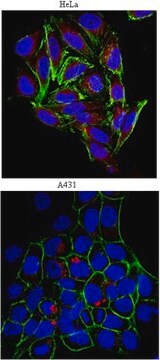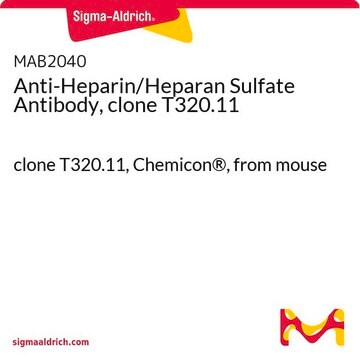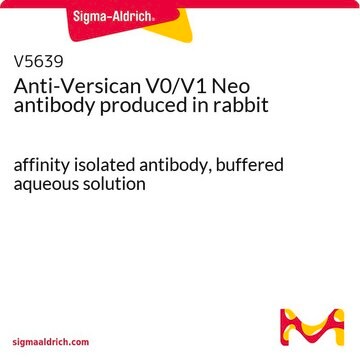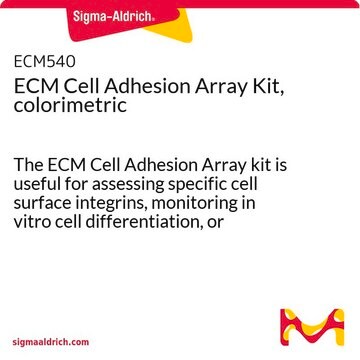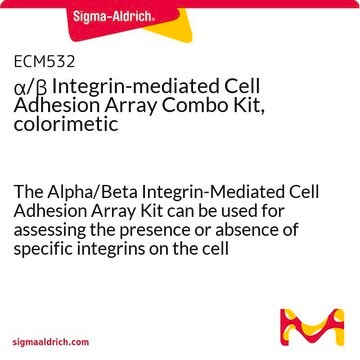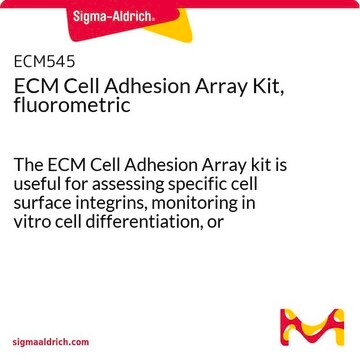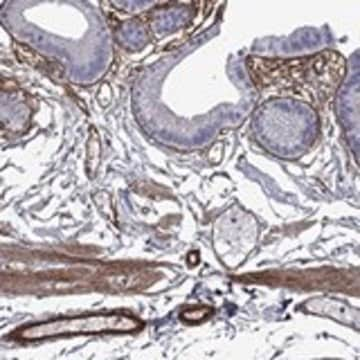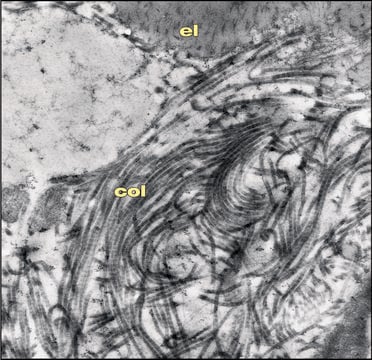MABT12
Anti-Heparan Sulfate Proteoglycan (Perlecan) Antibody, clone 5D7-2E4
clone 5D7-2E4, from mouse
別名:
heparan sulfate proteoglycan 2 (domain V region), perlecan proteoglycan, basement membrane-specific heparan sulfate proteoglycan core protein, HSPG, PLC
ログイン組織・契約価格を表示する
すべての画像(1)
About This Item
UNSPSCコード:
12352203
eCl@ss:
32160702
NACRES:
NA.41
おすすめの製品
由来生物
mouse
品質水準
抗体製品の状態
purified immunoglobulin
抗体製品タイプ
primary antibodies
クローン
5D7-2E4, monoclonal
化学種の反応性
human
テクニック
immunocytochemistry: suitable
immunohistochemistry: suitable
western blot: suitable
アイソタイプ
IgG1κ
NCBIアクセッション番号
UniProtアクセッション番号
輸送温度
wet ice
ターゲットの翻訳後修飾
unmodified
遺伝子情報
human ... HSPG2(3339)
詳細
Perlecan is one of the extracellular matrix forms of heparan sulfate proteoglycans (HSPGs). It is a large multidomain and binds to and cross-links many extracellular matrix (ECM) components and cell-surface molecules. Perlecan is synthesized by vascular endothelial and smooth muscle cells and deposited in the extracellular matrix within all mammalian tissues. HSPGs differ in their protein cores that are thought to determine the location of HSPG in either the cell membrane (syndecan and glypican) or the extracellular matrix (perlecan and dystroglycan). HSPGs found in the brain are dystroglycan, N-syndecan glypican, and perlecan. The composition of HS isolated from brain differs significantly from that of other organs and is developmentally regulated. Thus, differences in protein cores, disaccharide composition, the extent and position of sulfation, and the number of GAG chains diversify chemical structure and functions of HSPGs. The postulated functions of HSPG include cell proliferation, differentiation, adhesion, migration, and morphogenesis.
免疫原
Full length recombinant protein corresponding to human Perlecan.
アプリケーション
Research Category
細胞骨格
細胞骨格
Research Sub Category
ECMタンパク質
ECMタンパク質
Anti-Heparan Sulfate Proteoglycan (Perlecan) Antibody, clone 5D7-2E4 detects level of Heparan Sulfate Proteoglycan (Perlecan) & has been published & validated for use in IH.
Immunocytochemistry Analysis: A previous lot was used by an independent laboratory in IC. (courtesy of Whitelock, J. Graduate School of Biomedical Engineering, University of New South Wales, Sydney, Australia)
Western Blot Analysis: A previous lot was used by an independent laboratory on a 3-8% Tris-acetate gel in which the band appears above the 460 kDa marker. (courtesy of Whitelock, J. Graduate School of Biomedical Engineering, University of New South Wales, Sydney, Australia)
Western Blot Analysis: A previous lot was used by an independent laboratory on a 3-8% Tris-acetate gel in which the band appears above the 460 kDa marker. (courtesy of Whitelock, J. Graduate School of Biomedical Engineering, University of New South Wales, Sydney, Australia)
品質
Evaluated by Immunohistochemistry in fresh-frozen normal human tonsil tissue.
Immunohistochemistry Analysis: 1:300 dilution of the antibody detected Perlecan in fresh-frozen normal human tonsil tissue.
Immunohistochemistry Analysis: 1:300 dilution of the antibody detected Perlecan in fresh-frozen normal human tonsil tissue.
ターゲットの説明
469 kDa calculated
物理的形状
Protein G
Format: Purified
Purified mouse monoclonal IgG1κ in buffer containing 0.1 M Tris-Glycine (pH 7.4), 150 mM NaCl with 0.05% sodium azide.
保管および安定性
Stable for 1 year at 2-8°C from date of receipt.
アナリシスノート
Control
Fresh-frozen normal human tonsil tissue
Fresh-frozen normal human tonsil tissue
その他情報
Concentration: Please refer to the Certificate of Analysis for the lot-specific concentration.
免責事項
Unless otherwise stated in our catalog or other company documentation accompanying the product(s), our products are intended for research use only and are not to be used for any other purpose, which includes but is not limited to, unauthorized commercial uses, in vitro diagnostic uses, ex vivo or in vivo therapeutic uses or any type of consumption or application to humans or animals.
適切な製品が見つかりませんか。
製品選択ツール.をお試しください
保管分類コード
12 - Non Combustible Liquids
WGK
WGK 1
引火点(°F)
Not applicable
引火点(℃)
Not applicable
適用法令
試験研究用途を考慮した関連法令を主に挙げております。化学物質以外については、一部の情報のみ提供しています。 製品を安全かつ合法的に使用することは、使用者の義務です。最新情報により修正される場合があります。WEBの反映には時間を要することがあるため、適宜SDSをご参照ください。
Jan Code
MABT12:
試験成績書(COA)
製品のロット番号・バッチ番号を入力して、試験成績書(COA) を検索できます。ロット番号・バッチ番号は、製品ラベルに「Lot」または「Batch」に続いて記載されています。
Sokratis A Apostolidis et al.
Frontiers in immunology, 9, 2191-2191 (2018-10-18)
Objective: The mechanisms that lead to endothelial cell (EC) injury and propagate the vasculopathy in Systemic Sclerosis (SSc) are not well understood. Using single cell RNA sequencing (scRNA-seq), our goal was to identify EC markers and signature pathways associated with
Veronica De Paolis et al.
International journal of molecular sciences, 23(14) (2022-07-28)
The cellular heterogeneity of the tumor environment of breast cancer (BC) is extremely complex and includes different actors such as neoplastic, stromal, and immunosuppressive cells, which contribute to the chemical and mechanical modification of the environment surrounding the tumor-exasperating immune-escaping
Shoichiro Maeda et al.
British journal of pharmacology, 179(20), 4857-4877 (2022-07-08)
Chondroitin sulfate proteoglycan (CSPG) constitutes the neurogenic niche in the hippocampus. The reduction of hippocampal neurogenesis is involved in ageing-related cognitive decline and dementia. The purpose of this study is to find candidates that improve cognitive function by analysing the
Sofiane Hamidi et al.
Development (Cambridge, England), 147(3) (2020-02-06)
The pluripotent epiblast gives rise to all tissues and organs in the adult body. Its differentiation starts at gastrulation, when the epiblast generates mesoderm and endoderm germ layers through epithelial-mesenchymal transition (EMT). Although gastrulation EMT coincides with loss of epiblast
Steffen Rickelt et al.
Matrix biology : journal of the International Society for Matrix Biology, 71-72, 10-27 (2018-05-08)
The diversity of extracellular matrix (ECM) proteins encoded in mammalian genomes and detected by proteomic analyses generates a need for well validated antibodies against these proteins. We present characterization of a large number of antibodies against ECM proteins, from both
ライフサイエンス、有機合成、材料科学、クロマトグラフィー、分析など、あらゆる分野の研究に経験のあるメンバーがおります。.
製品に関するお問い合わせはこちら(テクニカルサービス)